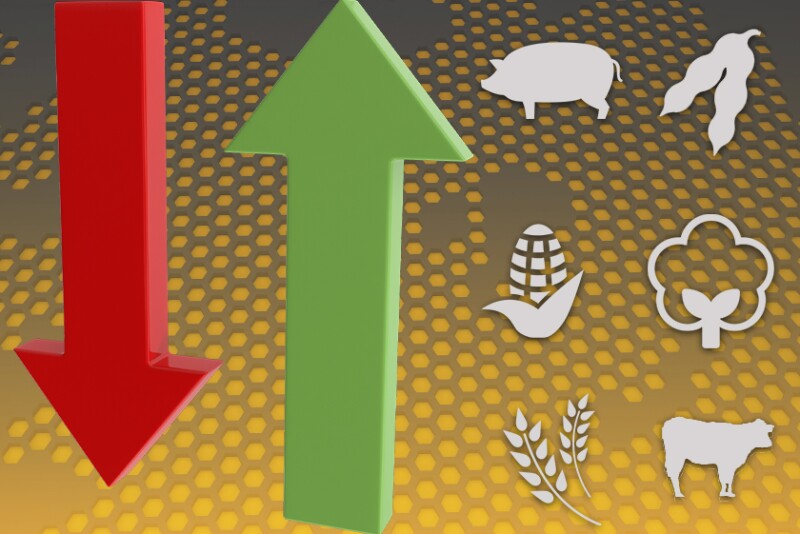GRAIN CALLS
Corn: Steady to 1 cent lower.
Soybeans: 11 to 12 cents higher.
Wheat: HRW and SRW futures 1 to 3 cents higher, spring wheat 1 to 4 cents lower.
GENERAL COMMENTS: Soybean futures rose above $15.00 overnight amid concern over dryness in Argentina and hopes easing Covid restrictions in China will boost commodity demand. Corn fell slightly while wheat was mixed. Malaysian palm oil futures rallied over 7% and hit a near three-week high after China said it would further ease border controls for inbound travelers. Front-month crude oil fell over 50 cents. U.S. stock index futures signal a firmer open, while the U.S. dollar index is slightly lower.
South America’s weather outlook changed little overnight. Argentina “will get some very important rain Saturday night through Monday, but it may not be enough to carry crops through the following full week of drying,” World Weather Inc. said. The following week, temperatures will be trending warmer than usual. Brazil weather will be “favorably mixed” for most of the nation, although parts of western, southern and central Rio Grande do Sul will experience limited rainfall and rising plant stress.
Ship insurers said they are cancelling war risk coverage across Russia, Ukraine and Belarus, following an exit from the region by reinsurers in the face of steep losses. Reinsurers, who insure the insurers, typically renew their 12-month contracts with insurance clients on Jan. 1, giving them the first opportunity to scale back exposure since the war in Ukraine started. P&I (protection and indemnity) clubs American, North, UK and West are no longer able to offer war risk cover for liabilities in the region from Jan. 1, they said. Ships typically have P&I insurance, which covers third party liability claims including environmental damage and injury.
Chinese hospitals and funeral homes were under intense pressure on Wednesday as a surging Covid-19 wave drained resources. The speed at which China has scrapped Covid rules has left its health system overwhelmed.
Taiwan will test arrivals from China for Covid-19 from Jan. 1 in response to a surge in cases there, the government said on Wednesday, joining other countries in stepping up controls on travelers coming from China.
Malaysia maintained its export tax for crude palm oil at 8% for January and raised its reference price. The world’s second-largest palm exporter calculated a reference price of 3,889.52 ringgit ($880.98) per metric ton for January, up slightly from 3,847.24 ringgit for December.
ING analysts expect oil prices to rise back above $100 in 2023, as a combination of lower Russian oil supply and OPEC+ supply cuts tighten the global oil market, according to a research note. They project Brent crude prices to average $104 a barrel in 2023 and WTI to average $101.
CORN: March corn traded within the previous session’s range overnight after gaining 8 1/2 cents Monday to $6.74 3/4, the contract’s highest close since Nov. 7.
SOYBEANS: March soybeans traded within the previous session’s range overnight but climbed as high as $15.05 3/4, after posting a six-month intraday high of $15.22 3/4 Monday.
WHEAT: March SRW wheat traded within the previous session’s range overnight after rising Tuesday to $7.84 1/2, the contract’s highest intraday price since Dec. 1.
LIVESTOCK CALLS
CATTLE: Steady-mixed
HOGS: Steady-firm
CATTLE: Live cattle futures may extend Monday’s gains behind surging wholesale beef prices and expectations for continued cash strength. Choice cutout values surged $8.09 Monday to $280.04, the highest daily average since Feb. 3, but movement was light at 78 loads. Packers have slowed production and raised wholesale beef prices to improve margins so they can be more aggressive with cash cattle bids after the holidays. USDA-reported live steers averaged $156.26 last week, up 57 cents from last week’s average and the first increase in three weeks.
February live cattle rose 12.5 cents Monday to $157.875, a lifetime-high close for the third session in the past four.
HOGS: Lean hog futures may find support from followthrough technical buying from Monday’s sharp rally in nearby February contract, but gains may be limited by continued cash softness. The CME lean hog index is down 13 cents to $78.60 (as of Dec. 23), the lowest since late January, as the cash market continues its seasonal decline. Last year at this time, the cash index had already bottomed and begun an extended rally to the seasonal peak in early August. Pork cutout values fell $1.14 Monday to $90.92, down from a five-week high. Movement was lighter at 268 loads. February lean hogs soared $3.65 Monday to $91.475, the highest close since Sept. 20.

